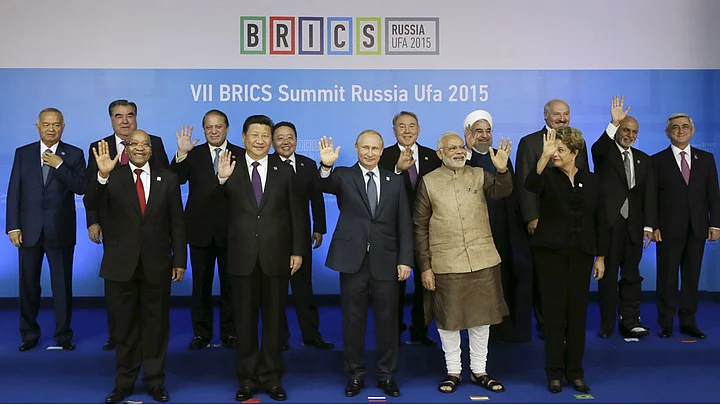India Stands to Benefit
- Over the years, SCO has enhanced collaboration through increased military cooperation, intelligence sharing and counter-terrorism
- India’s presence in SCO could be helpful in keeping itself informed and safeguarding our interests.
- India’s SCO Membership will help it to pro-actively engage and collaborate with Central Asia
The decision to initiate the process of membership of Shanghai Cooperation Organization (SCO) by India (as also Pakistan) was adopted by member countries of this body at its summit in Ufa, Russia on 9-10 July, 2015. The process is expected to conclude by the next summit in Uzbekistan.
India has held the status of observer to SCO since 2005. Although India has informally indicated its interest repeatedly in upgrading its association with this body over the last five years, it put in its application for membership only last year at the summit in Tajikistan when it became clear that the organisation had finalized the rules, terms and conditions for admitting new members. A moratorium had been placed by this organisation at its summit in 2010 on admitting new members pending finalisation of rules on the subject.
SCO owes its origin to the Shanghai Five which was established with Russia, China, Tajikistan, Kyrgyzstan and Kazakhstan as members in April 1996 with the principal objective of settling land borders between these states. It was a Chinese initiative to settle its boundaries with countries which had emerged newly after the disintegration of the Soviet Union. China was also keen to seek cooperation of neighbouring states in its fight against the separatist Uighur elements that were battling for an independent East Turkestan in its Xinjiang Province.
Membership of the body was expanded with the inclusion of Uzbekistan in June 2001 when the organisation was re-christened as Shanghai Cooperation Organization.
Not An Isolated Formation
The organisation’s initial concerns were related to threats to regional security and stability of its member countries. Over the years SCO has enhanced collaboration through increased military cooperation, intelligence sharing and counter-terrorism. With passage of time, many other issues including trade, energy (oil and gas), joint use of water resources, exploration of new hydrocarbon resources, infrastructure projects, telecommunications etc have been added.
SCO signed an Agreement of Cooperation with the Collective Security Treaty Organization (CSTO) in Oct, 2007 to broaden cooperation in the field of regional security, crime and drug-trafficking. It has conducted a number of joint military exercises known as Peace Mission exercises. SCO is not a military bloc so far.
SCO has established the Regional Anti-Terrorist Structure (RATS) in Uzbekistan to exchange and collate information and intelligence to fight terrorism and promote regional security.
What’s at Stake for India
SCO has kept itself abreast of the evolving situation in Afghanistan. The Afghan President is a Special Invitee to all SCO Summits since 2004. With the withdrawal of US and NATO forces from Afghanistan in 2014, SCO could enhance its engagement to promote security and stability in that country. India’s security is inextricably linked to peace and stability in Afghanistan. The issue has become even more critical on assumption of power by Ashraf Ghani as President of Afghanistan last September and his marked tilt towards Pakistan and China.
Prospects of Talks between the Afghan Government and Taliban under the aegis of Pakistan and under the watchful eyes of USA and China look uncertain after the first round in Murree, Pakistan on 7th July. Currently India has no role in the talks. India’s presence in SCO could be helpful in keeping itself informed about developments and steering them in a direction which would safeguard our interests.
SCO Membership will enable India to take active part in all issues under deliberation including security, defence, trade, energy, water, infrastructure, connectivity etc and ensure that India’s interest are safeguarded and promoted.
Central Asian Ties
Another significant advantage would be the opportunity for the Indian Prime Minister to engage with leaders of all Central Asian countries regularly, every year at Summit level. Our relations with Central Asia have suffered on account of long neglect. PM’s recent visit to the five Central Asian States has been strategically significant in sending out a strong message about India’s keen interest in rejuvenating its ties with this Region.
PM Modi was successful in establishing a personal rapport with leaders of these countries. Interactions at SCO Summits could help in identifying new areas of collaboration viz. energy (oil, gas, uranium, coal) and minerals, transport, IT, pharmaceuticals, security, defence, infrastructure etc..They could also be helpful in advancing our cooperation in security and defence fields.
India could benefit from engagement with RATS by obtaining information on counter-terrorism efforts, regional and international security etc.
I am not sanguine that India’s SCO Membership would have any beneficial impact either on the resolution of border disputes between India and Pakistan or between India and China, or on expeditious resolution of issues plaguing the TAPI and IPI gas pipelines.
India’s SCO Membership will help it to pro-actively engage and collaborate with Central Asia and also take part in existing and new initiatives by SCO over a large canvas to promote peace, security and sustainable development in India and the Region.
(Ashok Sajjanhar is Secretary, National Foundation for Communal Harmony. He is also a former Indian Ambassador to Kazakhstan, Sweden and Latvia.)
(At The Quint, we question everything. Play an active role in shaping our journalism by becoming a member today.)
